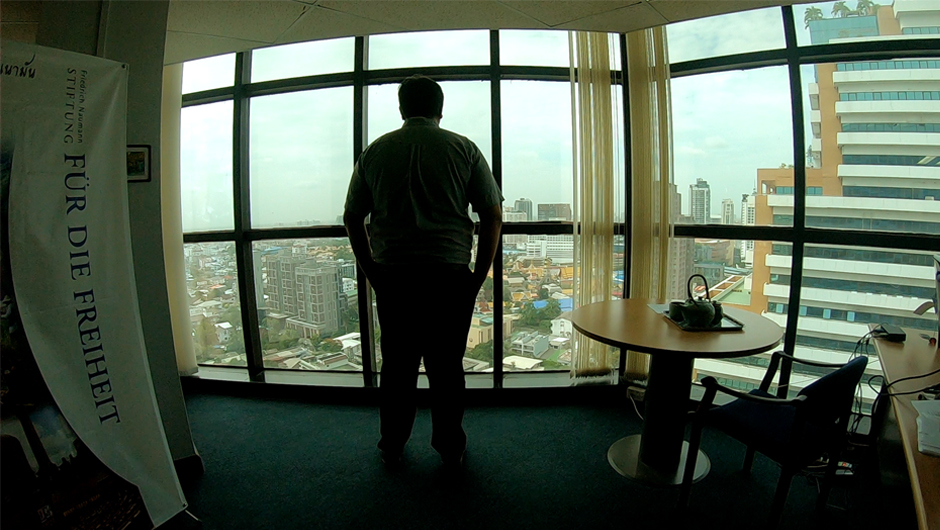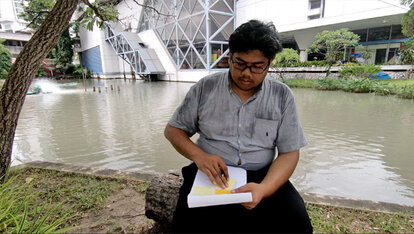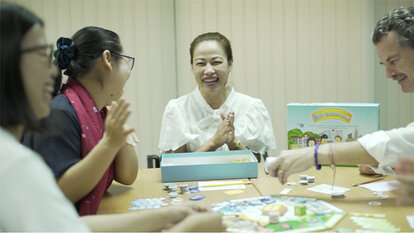Youth Unwasted: Leader, tutor, volunteer works for peace amid uncertainty

When he was five years old, history and politics were his bedtime stories. His playtime consisted of piling social science books to form towers to reach the sky. He was the only kid in school who had memorized the names of government cabinet members, and who could recite the events leading to the Black May uprising in Thailand. At a young age, he didn’t fully grasp the significance of the military crackdown, but as he grew he understood, finding himself at the heart of the conflict.
This child has grown to be a big guy, his hair ruffled and, sometimes, he has an unsure look on his face that gives way to certainty when he talks about politics. Now 29, he speaks about politics with passion, his eyes glittering with hope, masking the sadness.
“The insurgency in the south stole my youth. I devoted my younger years trying to help bring peace to our community, and it wasn’t easy. But if being deprived of my youth meant that the future generation would be able to enjoy theirs, then it was all worth it,” said Danyal Abdulloh, wise for his age.
Like any youth, Abdulloh is full of dreams. However, his are unselfish.
He wants to be an educator to make students embrace their civic responsibilities.
He aspires to become a published poet and inspire harmony.
He hopes to earn his master’s degree in social development and public administration and help improve governance.
He dreams of peace, freedom, and equal opportunities.
The long road to peace
Abdulloh grew up in Pattani, in far south Thailand, near the border with Malaysia. The insurgency in Pattani dates far back to history, attributed to ethnic and religious disputes. The violence escalated in the 2000s, and as in any armed conflict, the civilians were the most affected.
Like 80% of the population, Abdulloh is a Muslim. He believes that the Q’oran provides space where people can freely express themselves provided that they do not harm others.
Abdulloh’s sense of freedom made him explore a lot of different things. He became a busy young leader – a social science tutor, a youth camp volunteer, and the head of small organization.
His group organized discussions about the insurgency and its impact on the youth. Topics in these meetings revolved around political rights, that participation in civil and political life should not be hindered by anyone including the state. They talked about economic freedom, the concept of freely deciding how one manages his/ her own resources. Adbulloh was convinced that these subjects were interesting and relevant so he was surprised when overtime, attendance to the gathering started to wane.
It was then when he realized that the youth had a more pressing concern – having food on their table. “How can they have time for political discussions when they worry about what to eat the next day?” Abdulloh asked himself.

Innovative tools
Poverty can be debilitating but Abdulloh knew that education was the cure. He had to find new ways of teaching so that the students can be encouraged to participate in the discussions voluntarily. After all, it was always about freedom.
Abdulloh attended a consultation meeting between the government and civil society organizations in 2013. Dr. Mary Dusadeeisariyakul, program manager of the Friedrich Naumann Foundation for Freedom (FNF) was also there. During the open forum, Adbulloh raised this question: How can we open the political space so that it becomes more inclusive, and where people are given room to express themselves without restraints? He concluded that too much control leads to violence.
Dusadeeisariyakul found an ally in Abdulloh.
FNF had just introduced its Dream Thailand project, a series of events that had become a platform for students to reflect on societal problems and solutions, and to write down their dreams for the country. These notes were curated and forwarded to the government as a form of feedback. In the initial stages, Dream Thailand was mainly concentrated in cities such as Chiang Mai (upper north), Phitsanulok (lower north), Khon Kaen (northeast), Songkhla (south) and Chonburi (east). FNF’s partnership with Abdulloh brought Dream Thailand to the deep south, and resulted in the formation of Dream Youth South.
“Like any youth, Danyal was idealistic. But what differentiated him was his sincere commitment to help effect change,” said Dusadeeisariyakul.
When FNF rolled out its board game, SIM Democracy in the deep south, Abdulloh and Dream Youth South were among its first trainers, the group mainly catering to Muslim students and those in the southernmost provinces.
SIM Democracy is an interactive learning tool to educate the young and old alike about their role in governance. The players assume the character of either the government or citizens. The goal of the game is to build a prosperous community. Hence, rather than competing, the players need to collaborate with each other, similar to how a democracy functions.
FNF Thailand was among the first to recognize the effectiveness of gamification in education. To date, SIM Democracy has been played in 552 schools and universities in Thailand, as well as in government agencies like the Office of the Election Commission and Ministry of Justice, and several local governments. It is also being used in a number of countries in Asia: Indonesia, Korea, Malaysia, Myanmar, Pakistan, and the Philippines, and even as far away as Germany and Zimbabwe. FNF Thailand has developed other games: Human Rights Cards Game, Media Literacy Game, and Peacesocracy board game.
“Democracy and human rights can be complicated concepts. We have to make them relatable, and explain them in a way that people, especially the youth, would understand,” Dusadeeisariyakul pointed out.
Abdulloh can only agree. Employing innovative tools has enabled Dream Youth South to gather more students, and ignite their interest in politics.

One battle at a time
The hefty guy that he is, Abdulloh wasn’t shy to say that he cried when the 2014 coup erupted. The peace deal with the Muslim rebels in the south was just signed on 28 February 2013. Abdulloh called it the Day of Hope, and he was afraid that this would be short-lived. He didn't want the future of Pattani to be yet again uncertain.
He recalls his favorite movie, The Hunger Games, a film about dictatorship and a young girl leading the rebellion. “I like stories on dystopia because they reflect what’s happening in real life,” shared Abdulloh. “I don’t think I’ve become jaded. I just learned to be pragmatic.”
The feeling of uncertainly and a more mature grasp of reality brought Abdulloh to northeast Thailand to complete his master’s degree. Unfortunately, the opportunity to study was not in Pattani, but he vows to go back home.
For now, he keeps himself updated with news from friends via the internet. He continues to write poems about blue skies where people of any age or color regardless of origin and faith stand under. He scribbles on little stick-it notes – about his dream of peace, freedom, and equal opportunities, about youth unwasted. He believes they will all come true.
The Friedrich Naumann Foundation for Freedom (FNF), a German organization that promotes liberal democracy. As FNF celebrates its 60 years, it looks back to the contributions of its partners, and acknowledges their role in defending, strengthening, and increasing freedom.
Danyal Abdulloh’s Freedom Journey is part of FNF Regional Office Southeast & East Asia’s feature series ‘60 Years Diaries’.